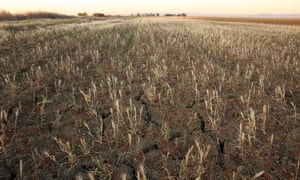ScienceRocks
Democrat all the way!
- Banned
- #1
The Central Valley is sinking: drought forces farmers to ponder the abyss
The Central Valley is sinking: drought forces farmers to ponder the abyss
As people dig ever deeper to find water, nearly 1,200 square miles of California is sinking 2 inches a month – destroying roads, bridges and farmland in the process

Cracks form in a field near Firebaugh, California. Photograph: David McNew/Getty Images
Suzanne Goldenberg in Firebaugh, California
Wow, this sucks for the people effected by it.
The Central Valley is sinking: drought forces farmers to ponder the abyss
As people dig ever deeper to find water, nearly 1,200 square miles of California is sinking 2 inches a month – destroying roads, bridges and farmland in the process

Cracks form in a field near Firebaugh, California. Photograph: David McNew/Getty Images
Suzanne Goldenberg in Firebaugh, California
On a day when the skies were ashen from the smoke of distant wildfires, Chase Hurley kept his eyes trained on the slower-moving disaster at ground level: collapsing levees, buckling irrigation canals, water rising up over bridges and sloshing over roads.
This is the hidden disaster of California’s drought. So much water has been pumped out of the ground that vast areas of the Central Valley are sinking, destroying millions of dollars in infrastructure in the gradual collapse.
Four years of drought – and the last two years of record-smashing heat – have put water in extremely short supply.
Such climate-charged scenarios form the backdrop to the United Nations negotiations starting in Paris on 30 November, which are seeking to agree on collective action to reduce greenhouse gas emissions.
But the real-time evidence of climate change and the other effects of human interference in natural systems are already changing the contours of California’s landscape.
Wow, this sucks for the people effected by it.

